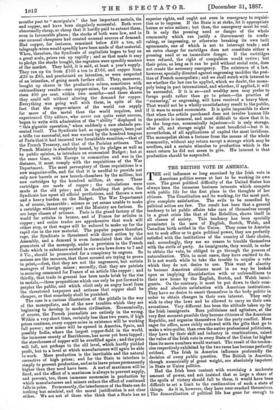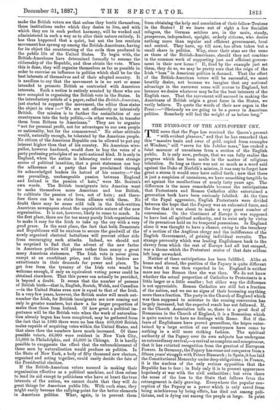THE BRITISH VOTE IN AMERICA.
THE evil influence so long exercised by the Irish vote in American politics seems at last to be working its own cure. The great political difficulty of the United States has always been the immense business interests which compete with public life for the first place in the thoughts of her citizens. The Constitution and its working, for the most part, give complete satisfaction. The evils to be remedied by political action are few. The result has been that a general tendency to let public affairs take care of themselves except in a great crisis like that of the Rebellion, shows itself in all classes of society. This tendency has been specially prominent in the men of English, Scotch, Welsh, and Canadian birth settled in the Union. They come to America not to seek office or to gain political power, they are perfectly satisfied with the institutions of the country of their choice, and, accordingly, they see no reason to trouble themselves with the strife of party. As immigrants, they would, in order to obtain the vote, be obliged to go through the process of naturalisation. This, in most cases, they have omitted to do. It is not worth while to take the trouble to acquire a vote which they do not desire to use. This want of alacrity to become American citizens must in no way be looked upon as implying dissatisfaction with or unfriendliness to their new home by the English, Scotch, and Welsh immi- grants. On the contrary, it mast be pat down to their com- plete and absolute satisfaction with American institutions. They have no desire to assert themselves in the body politic in order to obtain changes in their own interest. They only wish to obey the laws and be allowed to carry on their own avocations. Very different has been the attitude taken up by the Irish immigrants. Born politicians and agitators, at the very first moment possible they become citizens of the American Republic, and organise themselves for the party conflict. More eager for office, more richly endowed with the gifts that go to make a wire-puller, than even the native professional politicians, they have by their skill and industry in combinations, raised the value of the Irish vote in every State of the Union far higher than its mere numbers would warrant. The result of the tenden- cies respectively exhibited by the two races has become perfectly evident. The Irish in America influence profoundly the decision of every public question. The British in America, though numerically of great weight, are absolutely impotent in State or Union politics.
Had the Irish been content with exercising a moderate amount of power, and not insisted that so large a share of the spoils of victory should fall to them, it would have been difficult to set a limit to the continuation of such a state of things. As it is, however, they have over-reached themselves. The demoralisation of political life has gone far enough to
make the British voters see that unless they bestir themselves, those institutions under which they desire to live, and with which they are in such perfect harmony, will be worked and administered in such a way as to alter their nature entirely. It has thus happened that a quiet, but not the less resolute movement has sprung up among the British-Americans, having for its object the counteracting of the evils thus produced in the public life of the United States. To begin with, the British-Americans have determined formally to assume the citizenship of the Republic, and thus obtain the vote. When this is done, they will organise themselves as far as possible in order to exercise an influence in politics which shall be for the best interests of themselves and of their adopted country. It is needless to say that the movement is in no sort or sense intended to promote British as contrasted with American interests. Such a notion is entirely scouted by those who are now occupied in organising the British vote in the States. In the introductory article of a paper, called the British-American, just started to support the movement, the editor thus states the object in view :—" We are not offensively or intrusively British. Our mission is to further the assimilation of our countrymen into the body politic,—in other words, to transfer them from Britons to Americans." They are to organise "not for personal profit, not for advantages to our own people or nationality, but for the commonweal." No other attitude would, naturally enough, be tolerated by the American people. No citizen of the American Republic can be allowed to put any interest higher than that of his country. No American wire- puller, however hardened, would dare to buy the votes of a party professing principles of an anti-national kind. It is only in England, when the nation is labouring under some strange access of political inanition, that a great statesman can buy the adherence of a party that has proclaimed through its acknowledged leaders its hatred of his country—" the one prevailing, unchangeable passion between England and Ireland is the passion of hate," were Mr. Sexton's own words. The British immigrants into America want to make themselves more American and less British, to cultivate the passion of love, not of hate ; and there- fore there can be no stain from alliance with them. No doubt there may be some wild talk in the Irish-written American newspapers about the unpatriotic nature of the new organisation. It is not, however, likely to come to much. In the first place, there are far too many purely Irish organisations to make it easy for the Irish to take up the cry with a very good grace. In the next place, the fact that both Democrats and Republicans will be anxious to secure the goodwill of the newly organised electoral battalions will prevent either side from encouraging such attacks. Indeed, we should not be surprised to find that the advent of the new factor in American politics will please rather than annoy a great many American statesmen. The Irish vote is never given except at an exorbitant price, and the Irish leaders are extortionate in their demands for power and place. To get free from the tyranny of the Irish vote would be welcome enough, if only an equivalent voting power could be obtained elsewhere. That this power can actually be provided, is beyond a doubt. It seems that the number of persons of British birth—that is, English, Scotch, Welsh, and Canadian —in the United States even now is equal to that of the Irish. In a very few years, however, the British males will much out- number the Irish, for British immigrants are now coming not only in greater numbers, but show a far larger proportion of males than those from Ireland. Of how great a political im- portance will be the British vote when the work of naturalisa- tion already begun has been completed, may be gathered from the fact that in 1880 there were no less than 400,000 British males capable of acquiring votes within the United States, and that since then the numbers have much increased. Of these possible voters, 46,000 were resident in New York City, 55,000 in Philadelphia, and 45,000 in Chicago. It is hardly possible to exaggerate the effect that the enfranchisement of these men by naturalisation would produce on politics. In the State of New York, a body of fifty thousand new electors, organised and acting together, could easily decide the fate of the Presidential election.
If the British-American voters succeed in making their organisation effective as a political machine, and then refuse to lend its aid except to politicians who have at heart the true interests of the nation, we cannot doubt that they will do great things for American public life. With such aims, they might easily become the rallying-point for the better elements in American politics. What, again, is to prevent them from obtaining the help and association of their fellow-Teutons in the States I If we leave out of sight a few Socialist, refugees, the German settlers are, in the main, steady, prosperous, independent, upright, orderly citizens, who desire nothing more than regular and efficient government, local and marsh They have, up till now, too often taken but is small share in politics. Why, since their aims are the same as those of the British-Americans, should they not combine in the common work of supporting just and efficient govern- ment in their new home ? If, fired by the example just set them, they do so, we may be pretty sure that the reign of the Irish " boss " in American politics is doomed. That the effort of the British-American voters will be successful, we most heartily desire, not because we imagine that any national advantage in the narrower sense will accrue to England, but because we desire whatever may be for the beat interests of the English race. That the movement will succeed in making the Americans of British origin a great force in the States, we verily believe. To quote the words of their new organ in the Press:—" Obviously we are going to be a power in American politics. Somebody will feel the weight of us before long."







































 Previous page
Previous page